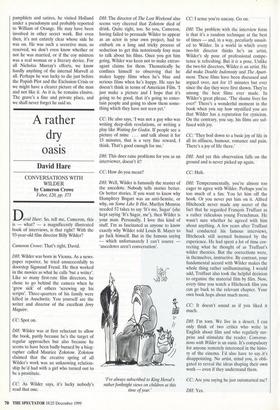A rather dry oasis
David Hare
CONVERSATIONS WITH WILDER by Cameron Crowe Faber, £20, pp. 373 David Hare: So, tell me, Cameron, this is — what? — a magnificently illustrated book of interviews, is that right? With the 93-year-old film director Billy Wilder?
Cameron Crowe: That's right, David.
DH: Wilder was born in Vienna. As a news- paper reporter, he tried unsuccessfully to doorstep Sigmund Freud. He then worked in the movies as what he calls 'but a writer'. Like so many first-rate film directors, he chose to go behind the camera when he 'grew sick' of others 'screwing up his scripts'. Three-quarters of his family were killed in Auschwitz. You yourself are the writer and director of the excellent Jeny Maguire.
CC: Spot on.
DH: Wilder was at first reluctant to allow the book, partly because he's the target of regular approaches but also because he seems to have been badly burned by a biog- rapher called Maurice Zolotow. Zolotow claimed that the creative spring of all Wilder's work was an unknowing relation- ship he'd had with a girl who turned out to be a prostitute.
CC: As Wilder says, it's lucky nobody's read that one. DH: The director of The Lost Weekend also seems very cheered that Zolotow died of drink. Quite right, too. So you, Cameron, having failed to persuade Wilder to appear as an actor in your own project, had to embark on a long and tricky process of seduction to get this notoriously foxy man to talk about his films. Once you got him going, Wilder was keen not to make extrav- agant claims for them. Thematically he confines himself to observing that he makes happy films when he's blue and serious films when he's happy. He says he doesn't think in terms of American Film. 'I just make a picture and I hope that it's going to be good, that it's going to enter- tain people and going to show them some- thing which they have not seen yet.'
CC: He also says, 'I was not a guy who was writing deep-dish revelations, or writing a play like Waiting for Godot. If people see a picture of mine ... and talk about it for 15 minutes, that is a very fine reward, I think. That's good enough for me.'
DH: This does raise problems for you as an interviewer, doesn't it?
CC: How do you mean?
DH: Well, Wilder is famously the master of the anecdote. Nobody tells stories better. Or better stories. If you want to know why Humphrey Bogart was an anti-Semite, or why, on Some Like It Hot, Marilyn Monroe needed 52 takes to say 'It's me, Sugar' (she kept saying 'It's Sugar, me'), then Wilder is your man. Personally, I love this kind of stuff. I'm as fascinated as anyone to know exactly why Wilder told Louis B. Mayer to go fuck himself. But in the famous saying — which unfortunately I can't source — 'anecdotes aren't conversation'.
'I've always subscribed to King Hemd's rather forthright views on children at this time of year.' CC: I sense you're uneasy. Go on.
DH: The problem with the interview form is that it's a random technique at the best of times — and, in a way, peculiarly unsuit- ed to Wilder. In a world in which every two-bit director thinks he's an artist, Wilder's sly pose of professional compe- tence is refreshing. But it is a pose. Unlike the two-bit directors, Wilder is an artist. He did make Double Indemnity and The Apart- ment. These films have been discussed and argued over, not for 15 minutes but ever since the day they were first shown. They're among the best films ever made. In Wilder's great phrase, 'The shame lives for ever!' There's a wonderful moment in the book when you say how mystified you are that Wilder has a reputation for cynicism. On the contrary, you say, his films are suf- fused with joy.
CC: 'They boil down to a basic joy of life in all its silliness, humour, romance and pain. There's a joy of life there.'
DH: And yet this observation falls on the ground and is never picked up again.
CC: Huh.
DH: Temperamentally, you're almost too eager to agree with Wilder. Perhaps you're too much of a fan. You let him off the hook. Or you never put him on it. Alfred Hitchcock never made any secret of the fact that he regarded Francois Truffaut as a rather ridiculous young Frenchman. He wasn't sure whether he agreed with him about anything. A few years after Truffaut had conducted his famous interviews, Hitchcock still seemed bemused by the experience. He had spent a lot of time cor- recting what he thought of as Truffaut's wilder theories. But the corrections were, in themselves, instructive. By contrast, your fundamental accord with Wilder makes the whole thing rather unilluminating. I would add, Truffaut also took the helpful decision to organise the material film by film. Now, every time you watch a Hitchcock film you can go back to the relevant chapter. Your own book hops about much more.
CC: It doesn't sound as if you liked it much.
DH: I'm torn. We live in a desert. I can only think of two critics who write in English about film and who regularly sur- prise and stimulate the reader. Conversa- tions with Wilder is an oasis. It's compulsory for anyone remotely interested in the histo- ry of the cinema. I'd also have to say.it's disappointing. No artist, mind you, is obli- gated to reveal the ideas shaping their own work — even if they understand them.
CC: Are you saying he just outsmarted me? DH: Yes.






















































































































 Previous page
Previous page